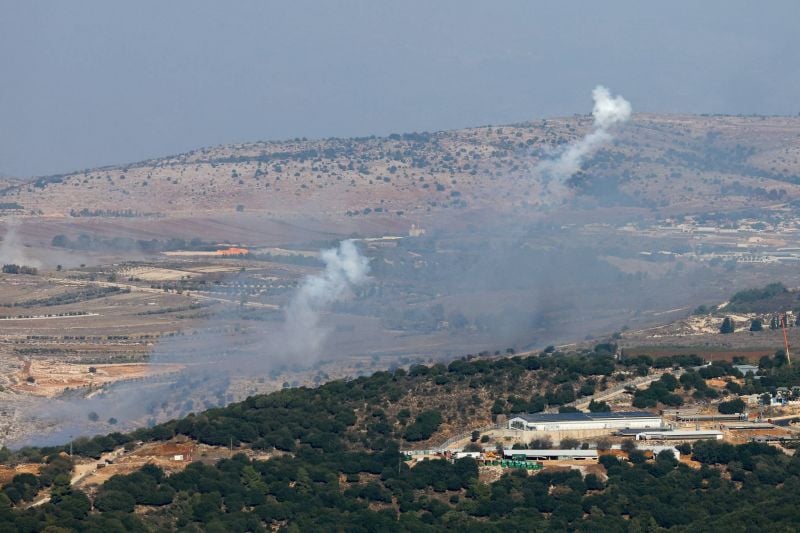
Smoke rises at the Israel-Lebanon border, as seen from northern Israel, Nov. 8, 2023. (Credit: Alexander Ermochenko/Reuters)
Here’s what happened yesterday and what to expect today, Thursday, Nov. 9
Want to get the Morning Brief by email? Click here to sign up.
Catch up on yesterday’s LIVE coverage of day 33 of the Hamas-Israel war here.
A Hezbollah anti-tank missile attack killed an Israeli civilian, the Israeli army radio said, amid ongoing border clashes. Hezbollah said its attack on a barracks inflicted casualties on the Israeli army in retaliation to a Sunday strike on southern Lebanon that hit an ambulance and wounded the first responders in it. Israeli news outlet Haaretz reported that two Israeli soldiers were wounded by anti-tank missiles. Israel's army radio later reported that an anti-tank missile fired from southern Lebanon killed a civilian in Kiryat Shmona, a frequent target of Hezbollah’s strikes. Earlier in the day, Israeli bombardments struck houses in Houla while shelling was reported around the southern Lebanese areas of Aita al-Shaab, Aitaroun, al-Dhayra, al-Labouneh, Blida, Helta, Mays al-Jabal, Mhaybib and Ramieh. Hezbollah second-in-command Sheikh Naim Qassem told the BBC that “any escalation would be linked to Israel's actions,” highlighting the “danger” posed by “aggression against civilians and killing more women and children.”
Lebanon's journalist and photographers union scheduled a sit-in for today in downtown Beirut in solidarity with “the journalists and children of Gaza,” the state-run National News Agency (NNA) reported. Hezbollah called for a protest around the same time in downtown Beirut to denounce “massacres against children in Gaza and Lebanon.” On Sunday, an Israeli bombardment killed a woman and her three grandchildren as they were traveling by car on the Aitaroun-Ainata road in southern Lebanon. Last month, an Israeli strike killed Reuters video journalist Issam Abdallah. Another incident saw a group of journalists pinned down by Israeli gunfire while they were reporting in southern Lebanon. Reporters Without Borders’s preliminary findings claimed Abdallah was killed by a deliberate strike. Last month, the Committee to Protect Journalists (CPJ) said that the period since Oct. 7 was the “deadliest” for journalists covering conflict since the organization began tracking in 1992. Several protests have been called for by Hezbollah Palestinian factions and others in support of Gaza since Oct. 7.
Israeli strikes have killed at least 10,569 Palestinians, including 4,324 children, since Oct. 7, according to Gaza’s health ministry, cited by Reuters. Israel continued its incursion into Gaza, fighting Hamas in the enclave’s largest city. Gaza City has been completely encircled, Israeli army spokesman Daniel Hagari said, adding, without ruling out the possibility of "humanitarian pauses," that a ceasefire is "not currently on the table at all." Abou Obeida, spokesman for the al-Qassam Brigades, said the group will continue fighting Israel on "all fronts." The ground incursion has been accompanied by an escalation in relentless shelling, which has drawn international criticism for its targeting of areas dense with civilians — including several refugee camps and hospitals. Medical personnel were trapped in al-Quds Hospital, unable to reach injured persons, due to Israel’s shelling of nearby roads, the Palestinian Red Crescent said on X (formerly Twitter). The International Committee of the Red Cross (ICRC) said seven vehicles delivering medical supplies to health facilities, including to al-Quds Hospital in Gaza, came under fire. “There is something clearly wrong in the way [Israeli] military operations are being done,” UN Secretary-General Antonio Guterres said yesterday, commenting on the devastating number of civilians killed. Guterres said that since Oct. 7, at least 92 UN staff have been killed. Qatar is reportedly negotiating brief ceasefires in exchange for the release of several hostages held by Hamas, according to AFP. Abou Obeida said that the only conditions under which Hamas will release hostages is through a "total or partial prisoner exchange," referring to Palestinians detained in Israeli prisons. Meanwhile, Israeli representatives declined to attend a Paris “humanitarian conference” for Gaza scheduled for today. Italy said it was sending a hospital ship close to the Gaza coast and that it is working on establishing a field hospital in Gaza. According to the US State Department, a security incident interrupted passages through the Rafah crossing. White House spokesperson John Kirby said over 80 trucks of humanitarian aid entered Gaza in the last two days. The hundreds of aid shipments — estimated to be a slim fraction of what is needed — that made it into the enclave have yet to include fuel, which is vital to maintaining hospitals, bakeries and other essential services, as emphasized by Gaza, international officials and medical experts alike.
In case you missed it, here’s our must-read story from yesterday: “Why did the Israeli army divide Gaza in two?”
Compiled by Abbas Mahfouz
Correction: The initial publication incorrectly attributed Amnesty International to a preliminary report on the death of Reuters journalist Issam Abdallah when the report belongs to Reporters Without Borders.